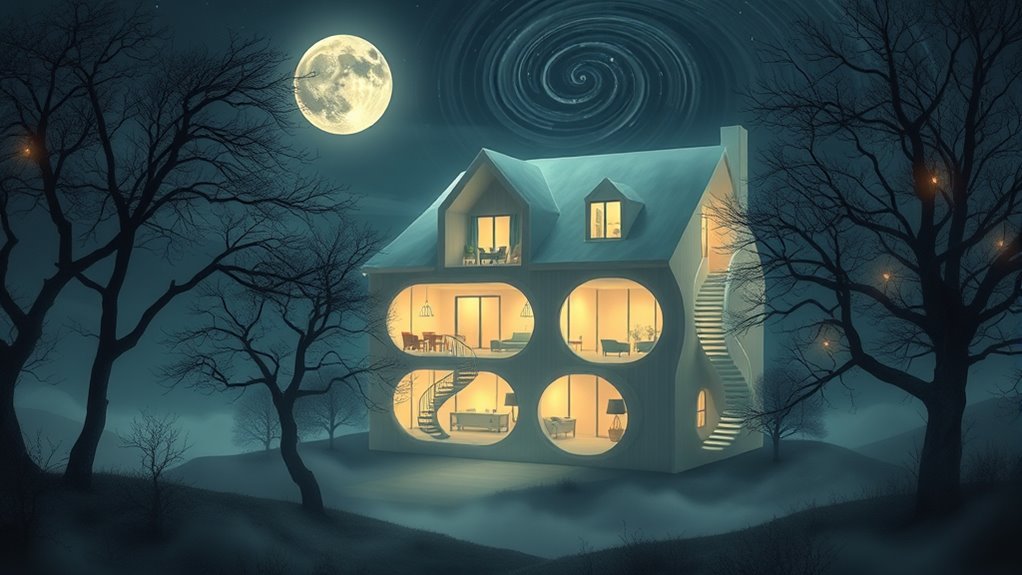Dreams of houses reveal your inner self, reflecting your desires, fears, and identity through symbolic architecture. The condition, size, and layout of the house often mirror emotional states and personal beliefs. For instance, a large mansion might symbolize success, while a cramped home points to insecurity. Emotional reactions to your dream house help uncover subconscious feelings. As you explore these symbols further, you’ll gain deeper insights into who you are and what you truly need in life.
Key Takeaways
- Houses in dreams symbolize aspects of your inner identity, desires, fears, and emotional state.
- The condition and layout of the house reflect your emotional well-being and personal control.
- Architectural features and environment provide insights into cultural influences and subconscious messages.
- Emotional reactions to the dream house reveal unresolved issues or areas needing attention.
- Analyzing dream houses helps uncover personal insights, fostering self-awareness and growth.

Dreams of houses often reflect your deepest desires, fears, and sense of identity. When you dream of a house, it’s rarely just about the structure itself; instead, it acts as a mirror for your inner world. The way a house appears in your dreams, its size, condition, and surroundings, all carry symbolic meaning rooted in architectural symbolism. These symbols reveal how you perceive yourself and your place in the world. For example, a sprawling mansion might symbolize feelings of abundance or the desire for success, while a small, cramped home could point to feelings of restriction or insecurity. Understanding these symbols helps you decode what your subconscious is telling you about your emotional state.
Dreams of houses reflect your inner world, desires, fears, and sense of identity through symbolic architectural meanings.
The emotional significance of the house in your dreams is often more impactful than the house’s physical features. It’s not just about the building but how it makes you feel. Do you feel safe, anxious, nostalgic, or trapped? These emotional responses give you clues about your current psychological landscape. A house that feels welcoming might indicate a sense of stability or contentment, while one that feels ominous may highlight unresolved fears or anxiety. Your emotional reactions to these dreams are essential because they connect directly to your personal experiences and feelings. Recognizing these emotional significances allows you to better understand your needs, hopes, and insecurities.
As you analyze your dreams of houses, pay attention to details like the condition of the home, its age, and the activities you perform there. An old, dilapidated house might symbolize unfinished emotional business or past trauma, whereas a new, pristine house could represent new beginnings or a desire for renewal. The layout of the house can also reflect your sense of control or chaos in your life. For example, a house with many rooms may symbolize different aspects of your personality or different areas of your life that you are trying to organize or understand. Conversely, a house with many locked doors might suggest feelings of secrecy or barriers you’ve put up. Additionally, the cultural significance of house symbols can influence how you interpret these dreams, as different backgrounds may assign various meanings to architectural features.
Ultimately, your dreams of houses serve as a personal map of your inner self. By examining the architectural symbolism and emotional significance of these dreams, you can gain valuable insights into your subconscious mind. These insights can empower you to confront fears, embrace desires, and foster a clearer sense of who you are. Your dreams are not just fleeting images—they’re messages from within, guiding you towards understanding your true self. Recognizing what your subconscious is trying to tell you through these dreams can help you navigate your waking life with more awareness and intention.
Frequently Asked Questions
How Do House Dreams Relate to Childhood Memories?
Your house dreams often connect to childhood nostalgia and your family origins. When you dream of familiar rooms or spaces, it’s like revisiting memories from your early years. These dreams reflect your subconscious feelings about safety, belonging, or unresolved issues from childhood. By paying attention to these house images, you can gain insights into how your past influences your present self and emotional well-being.
Can House Dreams Predict Future Life Changes?
You might notice that house dreams can predict future changes through psychological symbolism and subconscious reflection. Sometimes, coincidentally, you’ll dream of doors opening or rooms transforming, hinting at upcoming life shifts. These dreams tap into your subconscious, revealing hidden anxieties or hopes. By paying close attention to your house dreams, you could gain insight into how your mind prepares you for future events, guiding your decisions and growth.
What Do Recurring House Dreams Signify Psychologically?
Recurring house dreams often reveal subconscious patterns and emotional reflections you’re unaware of. They signify that your mind is processing unresolved issues, changes, or feelings related to your identity and personal growth. By paying attention to these dreams, you can gain insight into your emotional state and underlying concerns. Recognizing these signals helps you address hidden fears or desires, fostering greater self-awareness and emotional balance.
How Do Cultural Differences Influence House Dream Interpretations?
Cultural differences shape how you interpret house dreams, acting like lenses that color your perception. For example, in some cultures, a house symbolizes stability, while in others, it represents spiritual journey. Your interpretative frameworks are influenced by cultural symbolism, guiding you to see your subconscious through a unique lens. Recognizing these cultural nuances helps you understand your dreams better, revealing how your background shapes your inner world.
Are There Specific House Types Linked to Certain Personality Traits?
Yes, certain house types often reflect specific personality traits through architectural symbolism. For example, a sprawling mansion might indicate ambition and a desire for status, while a cozy cottage suggests warmth and introversion. You may find that your dreams of a tall tower mirror your aspirations and confidence, whereas a basement could symbolize hidden feelings or insecurity. Recognizing these personality correlations helps you understand your subconscious better.
Conclusion
As you reflect on these dreams of houses, remember they mirror your inner world—a maze of doors waiting to be opened. Each room reveals a part of yourself, waiting to be explored. Don’t shy away from what you find inside; instead, embrace it as the key to understanding who you truly are. After all, isn’t the house you build within the most essential sanctuary of all? Uncover your self, and let it guide your path forward.









